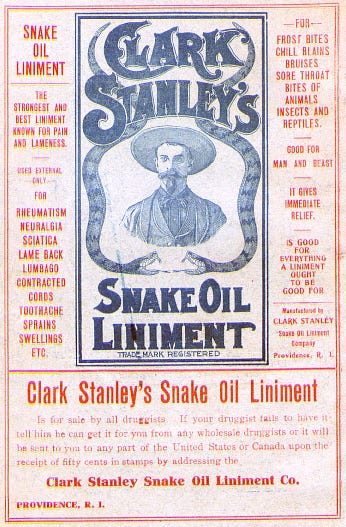What's wrong with snake oil?
I’m Brandon Wilson. I am constantly working toward improving my mind, body, and spirit using various ancient techniques and cutting-edge biohacking tools and devices. I want to be healthy, but not at the expense of being happy. This simple idea is what it means to be wellthy.
First time reading? Let’s get you in the club.
You know you enjoy a topic when you talk to complete strangers about it. When someone asks me about biohacking, I tell them, “Brace yourself. You’ve pulled my string!” I can talk to them until their ears fall off. I’ve encountered people who are open to new ideas and others who are very skeptical. Some have even suggested that the technologies I use are “snake oil.”
According to Smithsonian Magazine1: “Actual snake oil in the 1800s came from Chinese water snakes, and Chinese laborers who immigrated to the U.S. shared it with fellow workers as they helped build the transcontinental railroad. This type of snake oil was indeed an effective anti-inflammatory.” In the late 19th century, Clark Stanley, the self-proclaimed “Rattlesnake King,” sold his “snake oil” liniment to treat joint pain and rheumatism. Even though he marketed his product as snake oil, Stanley’s product only contained mineral oil, beef fat, red pepper, and turpentine. This era began the idea of calling ineffective substances “snake oil,” which is still commonplace today.

I used to be very skeptical. I dismissed products outright and demanded substantial proof before considering them. Had I not shifted my mindset during the pandemic, I would have been in the “follow the science” camp. We certainly all bore witness to the media narratives and government directives that had no relationship with actual science, which is a process and not a final outcome. Allow me to explain my current view of skepticism.
Health-related products and services fall into three general categories. The first category includes toxins that cause harm or can reasonably be assumed to cause long-term harm, even if there are no short-term effects. The second category includes products and services with no demonstrated harm or benefit. Skeptics would say products in this category don’t do anything. The third category includes products and services that have shown benefits based on current science. Note that interventions may shift between the second and third categories or even end up in the first category.
Two significant ideas inform my current viewpoint. First, the human body is a complex system, and there is still much we do not understand. We can create drugs that have specific effects, but we often don’t comprehend the unintended consequences (especially long-term effects). What we know today will likely change in the future. Two, the power of the mind to heal is authentic. Double-blind, randomized, controlled trials are the gold standard for scientific evidence because of the placebo effect.
Henry Beecher discovered the placebo effect as a medic in World War II. After running out of pain-killing morphine, he replaced it with a simple saline solution but continued telling the wounded soldiers it was morphine. Amazingly, 40 percent of the soldiers reported that the saline treatment eased their pain.2
“Whether you think you can or think you can’t, you’re right.” —Henry Ford
There could be many interventions in the second category that could help you simply because you believe they can. Hardcore skeptics will miss out on these benefits because of their disbelief. This doesn’t mean I’m naive or gullible. I choose to acknowledge how little we know about how the world works. I am open to experimenting when I don’t fully understand the mechanism behind how something works.
So, what’s wrong with snake oil? If you can reasonably assume no harm, why not be open to the idea that something can help you or help your body heal itself? At worst, there is no benefit, and you might lose some money. You paid for the knowledge and can now proceed to the next experiment.
The Daily Habit is where I share my habits related to the fundamentals: sleep, diet, physical activity, mindfulness, and stress management.
Is it possible you have not achieved specific goals or dreams because of your beliefs about yourself? Use this one-page worksheet to help identify some limiting beliefs that could be holding you back.
Be Wellthy Club entrants: Matt B., Scott L., Scott S., Ariel E., Renata B.
The November raffle is now closed with 21 entries.
Raffle prizes are for Be Wellthy Club Members only. Club members can email bewellthy@substack.com with the correct answer to each week’s brain training and be entered into a monthly raffle to win one of two prize packages every month. I do respond to every email.
This week:
Take the given words, and by moving a single letter from one word to the other, make a pair of synonyms or near synonyms. For example, given Boast - Hip, move the 's' from 'Boast' to 'Hip', creating two synonyms: Boat - Ship.
1. Burn - Bead
2. Rid - Tripe
3. Grove - Rout
4. Charm - Rush
5. Cream - Sweep
Three years ago, I shared a sample survey of questions to audit your environment and lifestyle from the book Radical Longevity. Let’s not blame genes for what our lifestyle and environment have done.
Radical Longevity
I’m Brandon Wilson. I am constantly working toward improving my mind, body, and spirit using various ancient techniques and cutting-edge biohacking tools and devices. I want to be healthy, but not at the expense of being happy. This simple idea is what it means to
Keep your loved ones informed with the most up-to-date information about wellness by sharing this newsletter.
https://www.smithsonianmag.com/innovation/how-snake-oil-became-a-symbol-of-fraud-and-deception-180985300/#:~:text=The%20history%20of%20snake%20oil,for%20joint%20pain%20and%20rheumatism.
https://www.brainfacts.org/archives/2012/the-power-of-the-placebo
Keep reading with a 7-day free trial
Subscribe to Be Wellthy to keep reading this post and get 7 days of free access to the full post archives.









